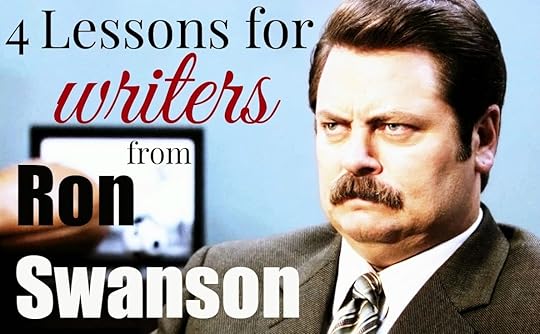4 Great Lessons for Writers from Ron Swanson
So my roommate and I just finished catching up on Parks and Rec.

I didn't expect to ever find a show with quite that perfect mixture of sweet and awkward and real and poignant that The Office had, but let me tell you, Parks and Rec came pretty darn close.
As with The Office, this show is all about character. We care about these shows not for the ridiculous and quirky plots, but because the characters are so absolutely engaging. Each character seems to be perfectly balanced between very grounded and recognizable as well as over-the-top quirky and interesting. If we can write characters the way Michael Scott and Leslie Knope were written, we're on a good road.
Perhaps my favorite character (well, one of them...there's just so many good options!) was of course, the oft quoted Ron Swanson. Quick bit of trivia for those who watch the show: did you know that Nick Offerman, who plays Swanson, is actually a carpenter, actually plays the saxaphone, and is actually married in real life to the actress who plays Tammy Two? That just brings me so much weird joy I can hardly stand it.
Anyway. With characters like Ron, we writers could do well to take lessons from both the character and the way he was written. So here are a few lessons I think writers can learn from Ron Swanson:

1. We love all-in characters: I think in any storytelling medium, we love over-the-top obsessed characters. Characters who are so into something we start being reminded of that character whenever we encounter their obsession in real life. Parks and Rec has many examples of this type of character quirk. For example, at our post-church "munch-and-mingle" yesterday we had strawberry shortcake with whipped cream and as I lathered on that yummy whipped cream I couldn't help but think of Leslie Knope. As for Ron Swanson, I think of him whenever I have a burger or a steak. Any big hunk of meat on my plate is a good Swanson moment for me. I smile to myself as I remember the utterly devastated look on his face when he sees that his favorite steak place has been boarded up. I really think it just comes down to loving characters who are absolutely passionate, and when its so specific and visceral, that's something that is very easy to connect with.

2. Your readers will have possibly surprising interests: The Ron Swanson we initially get to know is a burly, mustachioed, meat-loving, wood-carving lug of a man. His interest in meat and woodcarving seems to hit the nail right on the head. Of course someone like him would love meat and chopping down trees. Of course he could finish off an entire office building floor by himself in less time than it would take the entire reconstruction crew.
But then we are introduced to something surprising--Duke Silver, Swanson's swoon-causing saxophone playing alter-ego. This is a more covert but still solid part of Ron's identity. It will be the same with our readers. Writers are often told to focus on the clear interests of your ideal reader, and that is great advice. Approaching Ron Swanson via his interest in meat or carpentry is a good plan. But we might do well to keep in mind that the other, perhaps less obvious interests we may have, may be shared by people who would fit well in our readership. We can use these interests as social media and blog topics, or article ideas, or in a myriad of other ways.

3. Not all your readers will be on the grid: Anybody remember the episode when Ron finds out that advertising companies have some of his information, and he chucks his whole computer in the dumpster? Now that's an extreme example, but there are plenty of people who are best approached somewhere other than cyberspace. Perhaps there is a reader out there ideal for your particular book who gets most of her recommendations and info from friends or newspapers or magazines. We don't often think of those venues in our instant-info-internet era, but they are still very much there, and very valuable. This is why I think it wise for any writer, regardless the genre of your books, to pitch articles to various magazines and submit short stories and poetry to magazines and anthologies. There is still something very powerful about the printed page, and these venues provide a way to reach readers we may not have otherwise.

4. We love the soft side: One reason I love Ron Swanson so much is that my favorite characters are the ones with a gruff exterior who very rarely reveal their softer side. It just makes me squee with delight, and I'm pretty sure I'm not the only one. Our hearts are warmed when Ron hints in the best way he knows how the way he truly feels about Leslie. We love when Ron gets embarrassed or even slightly emotional. These show the human side of these types of characters and take them past entertaining into relatable.

I hope this gives you some good ideas and inspiration. What do you think? Can you think of any other lessons we writers can take from the Swanson?
Write on!
Sarah Allen
This Week on Social Media:

For more frequent updates, writing tips, and funnies, follow on Facebook, Twitter, Google+,
YouTube, Pinterest, Tumblr, GoodReads, and/or Instagram.
SUBMISSION OPPORTUNITIES:
Blue Mountain Arts: Blue Mountain Arts is interested in reviewing writings that would be appropriate for publication on our greeting cards. We are looking for highly original and creative submissions on love, friendship, family, philosophies, and any other topic that one person might want to share with another. Please note that we do not accept rhyming poetry. Ongoing.The Rain, Party, & Disaster Society: The Rain, Part, & Disaster society anthology is seeking poetry, non-fiction essays, and flash fiction that tackles their October theme: The End. Send your work that thematically, literally, or figuratively includes concepts of endings or the end of something. Due Oct. 15.Coe Review: The Coe Review is a magazine that unleashes refreshing perspectives and unheard voices. We accept all forms of poetry for our fall issue, and, from our hundreds of submissions, we choose those with original forms, styles, messages, and origins. Due Oct. 25.Dark Matter: Dark Matter publishes literary speculative poetry, flash fiction, short fiction, essays, and musings. We are interested in all things speculative in literature. We are not interested in anything dogmatic or mystical. Use natural metaphor to explore meaning and challenge traditional wisdom. Due Dec. 1SPOTLIGHTS: 10 Things That Red-Flag a Newbie Novelist (Anne R. Allen) 10 Things To Never Say to a Writer (Chuck Wendig at Terribleminds) One Great Way To Write A Short Story (Author Culture)How To Write a Story With Deep Structure (And Win A Prize For It) (Write to Done) 8 Simple Tweaks That Will Skyrocket Your Blogs Traffic (Michael Hyatt)

I didn't expect to ever find a show with quite that perfect mixture of sweet and awkward and real and poignant that The Office had, but let me tell you, Parks and Rec came pretty darn close.
As with The Office, this show is all about character. We care about these shows not for the ridiculous and quirky plots, but because the characters are so absolutely engaging. Each character seems to be perfectly balanced between very grounded and recognizable as well as over-the-top quirky and interesting. If we can write characters the way Michael Scott and Leslie Knope were written, we're on a good road.
Perhaps my favorite character (well, one of them...there's just so many good options!) was of course, the oft quoted Ron Swanson. Quick bit of trivia for those who watch the show: did you know that Nick Offerman, who plays Swanson, is actually a carpenter, actually plays the saxaphone, and is actually married in real life to the actress who plays Tammy Two? That just brings me so much weird joy I can hardly stand it.
Anyway. With characters like Ron, we writers could do well to take lessons from both the character and the way he was written. So here are a few lessons I think writers can learn from Ron Swanson:

1. We love all-in characters: I think in any storytelling medium, we love over-the-top obsessed characters. Characters who are so into something we start being reminded of that character whenever we encounter their obsession in real life. Parks and Rec has many examples of this type of character quirk. For example, at our post-church "munch-and-mingle" yesterday we had strawberry shortcake with whipped cream and as I lathered on that yummy whipped cream I couldn't help but think of Leslie Knope. As for Ron Swanson, I think of him whenever I have a burger or a steak. Any big hunk of meat on my plate is a good Swanson moment for me. I smile to myself as I remember the utterly devastated look on his face when he sees that his favorite steak place has been boarded up. I really think it just comes down to loving characters who are absolutely passionate, and when its so specific and visceral, that's something that is very easy to connect with.

2. Your readers will have possibly surprising interests: The Ron Swanson we initially get to know is a burly, mustachioed, meat-loving, wood-carving lug of a man. His interest in meat and woodcarving seems to hit the nail right on the head. Of course someone like him would love meat and chopping down trees. Of course he could finish off an entire office building floor by himself in less time than it would take the entire reconstruction crew.
But then we are introduced to something surprising--Duke Silver, Swanson's swoon-causing saxophone playing alter-ego. This is a more covert but still solid part of Ron's identity. It will be the same with our readers. Writers are often told to focus on the clear interests of your ideal reader, and that is great advice. Approaching Ron Swanson via his interest in meat or carpentry is a good plan. But we might do well to keep in mind that the other, perhaps less obvious interests we may have, may be shared by people who would fit well in our readership. We can use these interests as social media and blog topics, or article ideas, or in a myriad of other ways.

3. Not all your readers will be on the grid: Anybody remember the episode when Ron finds out that advertising companies have some of his information, and he chucks his whole computer in the dumpster? Now that's an extreme example, but there are plenty of people who are best approached somewhere other than cyberspace. Perhaps there is a reader out there ideal for your particular book who gets most of her recommendations and info from friends or newspapers or magazines. We don't often think of those venues in our instant-info-internet era, but they are still very much there, and very valuable. This is why I think it wise for any writer, regardless the genre of your books, to pitch articles to various magazines and submit short stories and poetry to magazines and anthologies. There is still something very powerful about the printed page, and these venues provide a way to reach readers we may not have otherwise.

4. We love the soft side: One reason I love Ron Swanson so much is that my favorite characters are the ones with a gruff exterior who very rarely reveal their softer side. It just makes me squee with delight, and I'm pretty sure I'm not the only one. Our hearts are warmed when Ron hints in the best way he knows how the way he truly feels about Leslie. We love when Ron gets embarrassed or even slightly emotional. These show the human side of these types of characters and take them past entertaining into relatable.

I hope this gives you some good ideas and inspiration. What do you think? Can you think of any other lessons we writers can take from the Swanson?
Write on!
Sarah Allen
This Week on Social Media:

For more frequent updates, writing tips, and funnies, follow on Facebook, Twitter, Google+,
YouTube, Pinterest, Tumblr, GoodReads, and/or Instagram.
SUBMISSION OPPORTUNITIES:
Blue Mountain Arts: Blue Mountain Arts is interested in reviewing writings that would be appropriate for publication on our greeting cards. We are looking for highly original and creative submissions on love, friendship, family, philosophies, and any other topic that one person might want to share with another. Please note that we do not accept rhyming poetry. Ongoing.The Rain, Party, & Disaster Society: The Rain, Part, & Disaster society anthology is seeking poetry, non-fiction essays, and flash fiction that tackles their October theme: The End. Send your work that thematically, literally, or figuratively includes concepts of endings or the end of something. Due Oct. 15.Coe Review: The Coe Review is a magazine that unleashes refreshing perspectives and unheard voices. We accept all forms of poetry for our fall issue, and, from our hundreds of submissions, we choose those with original forms, styles, messages, and origins. Due Oct. 25.Dark Matter: Dark Matter publishes literary speculative poetry, flash fiction, short fiction, essays, and musings. We are interested in all things speculative in literature. We are not interested in anything dogmatic or mystical. Use natural metaphor to explore meaning and challenge traditional wisdom. Due Dec. 1SPOTLIGHTS: 10 Things That Red-Flag a Newbie Novelist (Anne R. Allen) 10 Things To Never Say to a Writer (Chuck Wendig at Terribleminds) One Great Way To Write A Short Story (Author Culture)How To Write a Story With Deep Structure (And Win A Prize For It) (Write to Done) 8 Simple Tweaks That Will Skyrocket Your Blogs Traffic (Michael Hyatt)
Published on September 22, 2014 05:00
No comments have been added yet.



